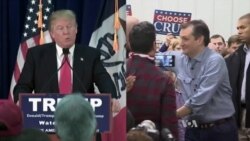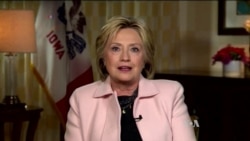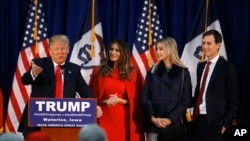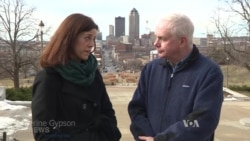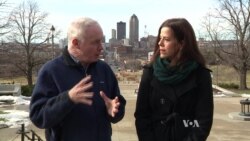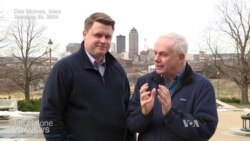The farm state of Iowa opens voting Monday in the first U.S. contest to pick Republican and Democratic presidential nominees, leading to November's national election.
The two poll-leading Republican presidential contenders - billionaire real estate mogul Donald Trump, conservative Texas Senator Ted Cruz - and several other candidates headed to more rallies as voting neared.
Election caucuses were set for 1,681 schools, firehouses and community centers throughout the state. A predicted snowstorm across Iowa is not expected to arrive until after voting has ended.
The top Democratic contenders, former Secretary of State Hillary Clinton and Vermont Senator Bernie Sanders, are locked in a tight contest for their party's nod in the first of a long series of state-by-state contests.
Clinton is confident of a win over Sanders, the self-described independent Democrat socialist.
"I know how to do this, and I'm ready," she told CNN Monday. "There is just a lot of excitement and energy. I'm urging everybody to come out and caucus tonight to be part of this unique American process."
Sanders urged his supporters to get out and caucus. ``We've got a tie ballgame - that's where we are,'' Sanders told volunteers and supporters in Des Moines Monday. ``We will struggle tonight if the voter turnout is low. That's a fact.''
Trump, a political novice facing his first election, told one interviewer he is "a little bit nervous" about the outcome. He exhorted supporters at a rally that even if they are sick, they need to get to the caucuses to vote for him.
"Get out of bed," he urged. "You've got to go."
Trump maintains a slight lead over Cruz, who appears to have made several missteps in the lead-up to the Iowa voting.
Iowa, geographically in the central part of the United States, is not a large state and at most a few hundred thousand voters are expected to take part in the caucuses.
But with its status as the first to vote in the lengthy presidential campaign, the Iowa results will give U.S. political pundits, a vast array of commentators on television and radio shows, newspapers, magazines and Internet blogs, a chance to offer a myriad of opinions on the outcome late Monday and in the coming week, before the next state, New Hampshire in the northeastern United States, votes February 9.
WATCH: VOA Snapshot of Iowa Race - Voters
Opinion polls in Iowa showed a tantalizingly close race for both the Republican and Democratic Party nominations, with non-establishment candidates continuing to show resiliency.
Final sprint
Candidates in both parties made a final sprint through Iowa Sunday, holding events in every corner of the state, stepping up attacks on rivals and making last-minute appeals to key voter groups.
Sunday morning TV network news shows also were a key platform. On ABC’s This Week, Trump tore into his main challenger Cruz, calling him a “total liar” and a “nasty guy.”
Trump also continued to raise questions about whether Cruz is eligible to run for president, because he was born in Canada to a Cuban father and an American mother.
Cruz shot back, challenging Trump’s conservative credentials on issues such as health care, and accusing Trump of running an immature campaign.
Cruz’s chances to win the Iowa caucuses are seen as slightly diminished after he suffered a shaky debate performance last week. His campaign also was on the defensive after sending out a campaign flier that appeared to threaten voters if they did not show up to vote.
Trump and Cruz are both trying to portray themselves as political outsiders, and are competing to attract evangelical Christians who comprise a large percentage of Iowa Republicans.
WATCH: VOA Snapshot of Iowa Race - Republicans
Sanders attacks Clinton on emails
Meanwhile, Sanders showed an increased willingness to raise questions about Clinton’s use of a personal email server during her time as secretary of state, from 2009 to 2013.
After months of refusing to make the issue a point of attack on the campaign trail, Sanders told CNN that the controversy is a “very serious issue.”
The U.S. State Department, which has been releasing Clinton’s emails in batches, on Friday said it would not publish 22 Clinton emails because they contained top secret classified information. Clinton's critics say her use of the private email server put U.S. national security at risk, and may even have violated some laws.
Clinton has said she did nothing wrong and that the emails were not marked classified at the time she received or sent them. On Sunday, Clinton repeated her stance the emails should be made public.
WATCH: VOA Snapshot of Iowa Race - Democrats
Another debate planned
The Sanders and Clinton campaigns on Sunday also reached an agreement with the Democratic National Committee (DNC) to hold additional debates, something many in the party had wanted.
The DNC says the next officially sanctioned debate will be held Thursday in New Hampshire, where Sanders has a substantial double-digit lead over Clinton.
But for now, all eyes are on Iowa.




